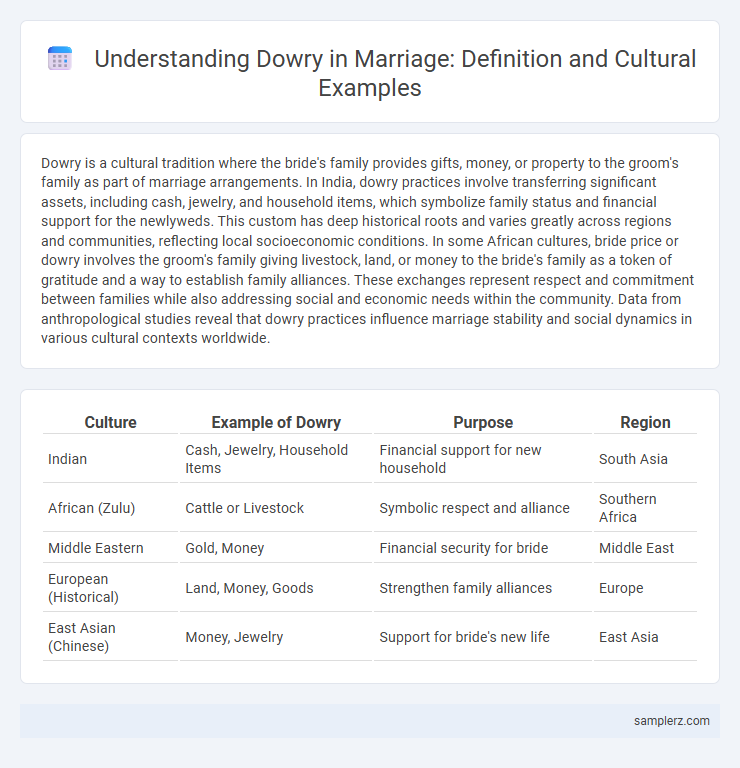Dowry is a cultural tradition where the bride's family provides gifts, money, or property to the groom's family as part of marriage arrangements. In India, dowry practices involve transferring significant assets, including cash, jewelry, and household items, which symbolize family status and financial support for the newlyweds. This custom has deep historical roots and varies greatly across regions and communities, reflecting local socioeconomic conditions. In some African cultures, bride price or dowry involves the groom's family giving livestock, land, or money to the bride's family as a token of gratitude and a way to establish family alliances. These exchanges represent respect and commitment between families while also addressing social and economic needs within the community. Data from anthropological studies reveal that dowry practices influence marriage stability and social dynamics in various cultural contexts worldwide.
Table of Comparison
| Culture | Example of Dowry | Purpose | Region |
|---|---|---|---|
| Indian | Cash, Jewelry, Household Items | Financial support for new household | South Asia |
| African (Zulu) | Cattle or Livestock | Symbolic respect and alliance | Southern Africa |
| Middle Eastern | Gold, Money | Financial security for bride | Middle East |
| European (Historical) | Land, Money, Goods | Strengthen family alliances | Europe |
| East Asian (Chinese) | Money, Jewelry | Support for bride's new life | East Asia |
Historical Origins of Dowry in Marriage
Dowry in marriage originated in ancient civilizations such as Mesopotamia and India, serving as a form of wealth transfer from the bride's family to ensure her financial security. Historical records reveal dowry practices aimed at strengthening family alliances and providing economic stability to the newlyweds. These cultural traditions influenced the evolution of marriage customs across different societies and time periods.
Dowry Practices Across Different Cultures
Dowry practices vary significantly across cultures, with South Asian countries like India and Pakistan traditionally involving substantial monetary or material gifts from the bride's family to the groom's family. In contrast, many African cultures emphasize bride price, where the groom's family provides livestock, money, or goods to the bride's family as part of marriage negotiations. European dowry traditions historically involved land, money, or valuables transferred to the groom or new household, reflecting social status and alliance building within aristocratic families.
Dowry Traditions in South Asian Marriages
Dowry traditions in South Asian marriages often involve the bride's family providing significant gifts, money, or property to the groom's family, reflecting socio-economic status and family prestige. These practices vary across countries like India, Pakistan, and Bangladesh, with cultural expectations influencing the type and value of dowry items. The dowry system has faced criticism and legal restrictions due to its association with social inequality and domestic violence.
African Dowry Customs: Case Studies
In many African cultures, dowry customs symbolize respect and unity between families, with specific practices varying widely across regions such as the Yoruba of Nigeria and the Zulu of South Africa. For instance, the Yoruba dowry often includes a combination of cash, clothing, and food items called "Bride Price" that honors the bride's family and secures marital bonds. The Zulu dowry, known as "Ilobolo," traditionally comprises cattle or their monetary equivalent, serving as a tangible expression of commitment and respect to the bride's lineage.
The European Perspective on Dowry Systems
Dowry systems in Europe historically varied, with practices often tied to property transfer and social alliances rather than large economic exchanges. In medieval Europe, dowries served as security for the bride's future and were crucial in noble families to strengthen political ties. Modern European societies have largely abandoned traditional dowry customs, reflecting shifts towards gender equality and legal reforms.
Dowry Gifts: Types and Symbolic Meanings
Dowry gifts in marriage often include valuable items such as gold jewelry, textiles, and household goods, each symbolizing prosperity, fertility, and the bride's family's respect. Gold jewelry represents wealth and security, while textiles like sarees or embroidered fabrics signify cultural heritage and the bride's integration into her new family. Household items highlight the transition to domestic life and the establishment of a prosperous home, reflecting the dowry's role in strengthening family bonds and social status.
Legal Frameworks Regulating Dowry
Legal frameworks regulating dowry vary significantly across cultures, with countries like India implementing the Dowry Prohibition Act of 1961 to criminalize the giving and taking of dowry in marriage. Enforcement mechanisms include penalties, fines, and imprisonment aimed at curbing dowry-related harassment and violence against brides. These laws reflect ongoing efforts to protect women's rights and promote equality within traditional marital customs.
Impact of Dowry on Social Status and Family Relations
Dowry practices significantly influence social status, often enhancing a family's prestige when substantial dowries are given, but can lead to social stigma if perceived as inadequate. This tradition affects family relations by creating economic pressures that may cause conflict and resentment between both families involved. The burden of providing dowry can exacerbate gender inequality, impacting women's roles and their perceived value within society.
Dowry-Related Challenges and Societal Issues
Dowry practices in marriage often lead to financial strain and gender-based discrimination, perpetuating inequality within families and communities. These challenges contribute to domestic violence, delayed marriages, and social stigmatization of brides perceived as having insufficient dowries. Efforts to address dowry-related issues include legal reforms and awareness campaigns targeting traditional norms that sustain these harmful customs.
Transformations in Dowry Traditions Today
Dowry traditions have significantly evolved as many cultures shift towards gender equality and legal reforms. Modern dowry practices often emphasize symbolic gifts or financial support for the couple's new life, rather than large bride prices or property transfers. Social movements and government policies in countries like India and Pakistan have contributed to reducing dowry-related abuses and promoting more equitable marriage customs.

example of dowry in marriage Infographic
 samplerz.com
samplerz.com